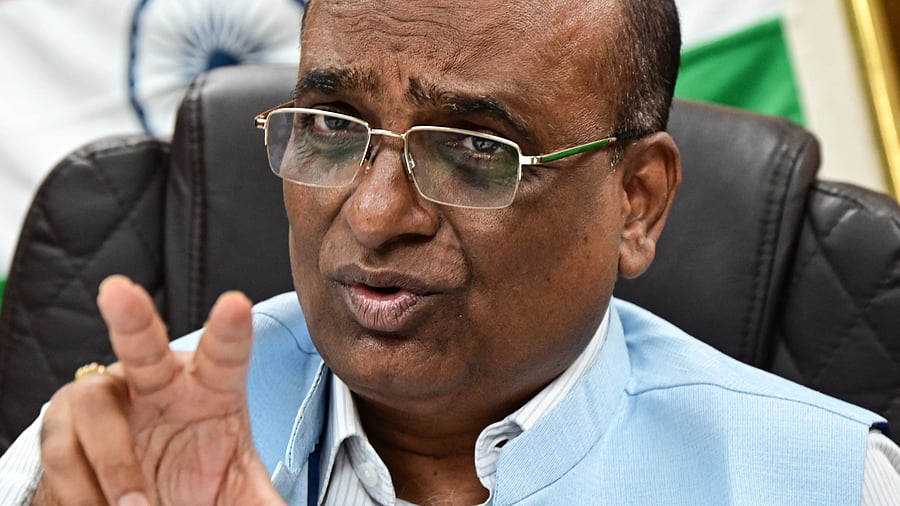
Karnataka state election commission chief GS Sangreshi at his state office.
DH Photo B K Janardhan
At a time when opposition parties are voicing concerns about the use of Electronic Voting Machines (EVMs), the Karnataka government has decided to revert to ballot papers for local body elections. The move comes even as the Election Commission of India (ECI) is set to begin its Special Intensive Revision (SIR) to electoral rolls in the state, while the State Election Commission (SEC) carries out its own revision. The overlap of these two exercises has drawn national attention and raised questions about possible confusion. Karnataka’s State Election Commissioner G S Sangreshi spoke about the return to ballot papers, preparations for the upcoming polls, and measures to ensure transparency. Excerpts.
What is the justification for reverting to ballot papers? How do you defend the decision?
The decision was taken by the state government. More importantly, the law itself allows voting to be conducted either through EVMs or ballot papers.
When EVMs replaced ballot papers, they were considered more scientific. What are the new considerations behind reverting to ballot paper?
I don’t know what the government’s considerations are, but there is nothing wrong with using ballot papers. Their use is not banned, right? In fact, around 120 countries—including many advanced democracies—continue to use ballot papers. In recent years, there has been public anxiety about EVMs. That concern needs to be addressed. Though the Supreme Court of India ruled that EVMs cannot be hacked, that doesn’t mean they must be used exclusively. We will provide police protection and compulsorily install CCTVs in all booths. This will bring down malpractice. CCTVs and police are two eyes of the election commission to hold the elections effectively and transparently. The process may be time-consuming, but it cannot be rejected for that reason alone.
You had told reporters that rural voters, many of whom are not literate, will find ballot papers easier to use than EVMs.
I didn’t say in that sense. That was misunderstood. When reporters asked whether voters used to EVMs for 25-30 years would find it difficult to switch to ballot papers, I clarified that rural people still use ballot papers in gram panchayat elections. Thus, it is not an issue at all. The sort of deep electoral experience that rural people have is not seen among people in urban places. Do we have to teach them about ballot papers? For the Hukkeri Cooperative Society elections, vice-presidential polls and all DCC Bank elections, they have used ballot papers. If that’s not a problem there, why should it be one now?
Have you begun consultations about these issues with political parties? If yes, what has been the response?
l Earlier, a Bharatiya Janata Party delegation met us. Similarly, a Congress delegation from Kalaburagi also wrote to us with their points. I have seen some reactions in the media, but I am not fully aware of their exact positions.
How are preparations for the upcoming polls?
We have the Greater Bengaluru Authority (GBA) polls first (the Supreme Court has mandated the SEC to start electoral roll revision in GBA limits from November 1 and report progress on November 3).
After that, we have gram panchayat, taluk panchayat, and zilla panchayat elections, as well as 188 local body elections. The year 2026 could become a year for local elections.
Since both the ECI and SEC are conducting roll revisions, will the presence of two electoral rolls create confusion?
I have written to the ECI, though we haven’t yet received a reply. But there won’t be any confusion. They may do their revision first, and we will do ours later — or vice versa. If there’s a time gap between the two exercises, new voters who have turned 18 will be added, and names of the deceased will be removed. The intention of both commissions is to ensure that the voter list is transparent and fair — not to create confusion for the voters. Both will do it as per their constitutional mandate.
The ECI is considering 11 documents plus Aadhaar for voter identification. What will the SEC follow?
We will follow the same guidelines of the Supreme Court. We cannot do anything different.
The local body elections have been delayed. When will you hold them?
It is difficult to say because the reservation list is yet to come. The government must specify which seats are reserved for SCs, STs, OBCs, women, and so on. Once they specify the list, we will proceed with the elections.
With both EVMs and ballot papers being used in different elections, is there any added pressure on the commissions? Is it possible to conduct the exercise without complaints?
We cannot say there won’t be any complaints. There should be complaints in a democracy. Only when complaints come will we be able to identify illegal voters and improve the process.
